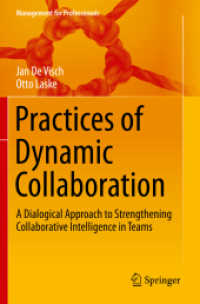- ホーム
- > 洋書
- > 英文書
- > History / World
基本説明
Another entertaining and surprising food history by the scholar who has come to define the discipline, Italian Identity in the Kitchen, or Food and the Nation tells how the production, consumption, and distribution of regional cuisine came to shape a collective Italian identity.
Full Description
Massimo Montanari draws readers into the far-flung story of how local and global influences came to flavor Italian identity. The fusion of ancient Roman cuisine-which consisted of bread, wine, and olives-with the barbarian diet-rooted in bread, milk, and meat-first formed the basics of modern eating across Europe. From there, Montanari highlights the importance of the Italian city in the development of gastronomic taste in the Middle Ages, the role of Arab traders in positioning the country as the supreme producers of pasta, and the nation's healthful contribution of vegetables to the fifteenth-century European diet. Italy became a receiving country with the discovery of the New World, absorbing corn, potatoes, and tomatoes into its national cuisine. As disaster dispersed Italians in the nineteenth century, new immigrant stereotypes portraying Italians as "macaroni eaters" spread. However, two world wars and globalization renewed the perception of Italy and its culture as unique in the world, and the production of food constitutes an important part of that uniqueness.
Contents
Translator's Preface Preface: Italy and Italians Before There Was an Italy There Was a Europe Italy Is a Network of Cities Models of Cooking Between Unified and Varied Popular Culture and Culture of the Elite People and Products That Travel Preservation and Renewal of Alimentary Identities Macaroni-eaters: How a National Stereotype Arose The Artusian Synthesis The Number of Italians Increases The "Italian Miracle": Between Modernity and Tradition The Invention of Regional Cooking Epilogue: In Search of Home Cooking Related Readings Index







